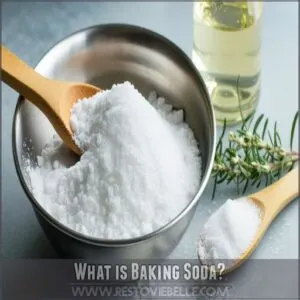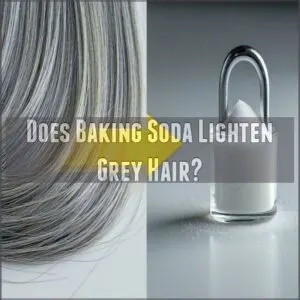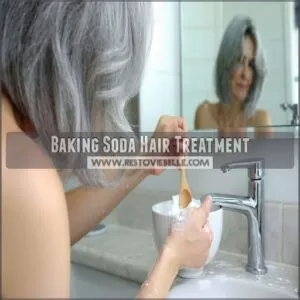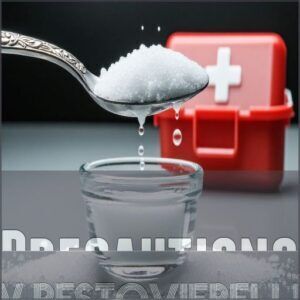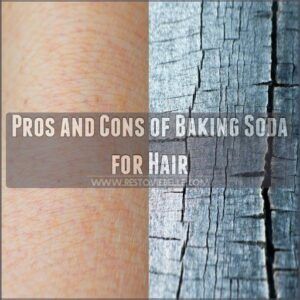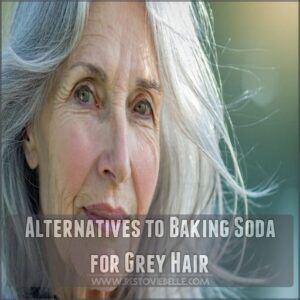This site is supported by our readers. We may earn a commission, at no cost to you, if you purchase through links.
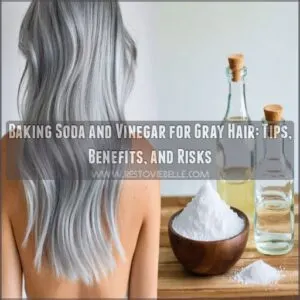 Thinking of using baking soda and vinegar for gray hair? You’re in for a natural hair adventure! This dynamic duo can help neutralize brassy tones and restore your silver strands‘ shine.
Thinking of using baking soda and vinegar for gray hair? You’re in for a natural hair adventure! This dynamic duo can help neutralize brassy tones and restore your silver strands‘ shine.
Mix baking soda and water into a gentle paste, apply for 5-15 minutes, then rinse thoroughly. The alkaline properties work like a color correction magic wand, while vinegar helps balance your hair’s pH.
But proceed with caution: overuse can strip natural oils and damage hair cuticles. It’s a temporary fix, not a permanent solution. Patch test first and use sparingly to keep your gray hair looking vibrant and healthy. Want to know more silver hair secrets?
Table Of Contents
- Key Takeaways
- What is Baking Soda?
- Does Baking Soda Lighten Grey Hair?
- How to Use Baking Soda on Grey Hair
- Pros and Cons of Baking Soda for Hair
- Baking Soda Hair Damage Risks
- Alternatives to Baking Soda for Grey Hair
- Should You Use Baking Soda on Grey Hair?
- Frequently Asked Questions (FAQs)
- What happens if you put baking soda on gray hair?
- What does vinegar do to gray hair?
- What does white vinegar and baking soda do to hair?
- Will baking soda and vinegar remove hair color?
- Can baking soda cause permanent hair damage?
- How often should vinegar rinse be used?
- Will baking soda work for thick hair?
- Does age affect baking soda hair treatment?
- Can baking soda trigger scalp sensitivity?
- Conclusion
Key Takeaways
- You’ll want to use baking soda sparingly on your gray hair, as it can strip natural oils and potentially damage your hair’s structure if overused.
- When applying a baking soda treatment, you’ll need to dilute it with water, create a gentle paste, and limit application time to 3-5 minutes to prevent scalp irritation and hair breakage.
- You should always follow up your baking soda treatment with a deep conditioning method to restore moisture and protect your hair’s natural pH balance.
- Instead of relying solely on baking soda, you’ll find more hair-friendly alternatives like purple shampoos and herbal toners that can help neutralize brassy tones in your gray hair more safely.
What is Baking Soda?
If there’s one pantry staple that pulls its weight, it’s baking soda. Also known as sodium bicarbonate, this fine powder has a mix of mild abrasive and alkaline properties that make it a standout for everything from cleaning to personal care.
Chemically, it combines sodium, hydrogen, carbon, and oxygen, giving it the power to neutralize acids, balance pH, and cut through grime. Understanding Baking Soda Uses is essential for maximizing its potential in various applications.
For hair, baking soda works as a natural cleanser and hair exfoliant, scrubbing away buildup from products and excess oil from the scalp. It helps restore balance by lifting residues that dull your strands, giving fresher, shinier hair underneath. Its pH of 9 makes it effective at tackling mineral deposits from hard water, especially useful for gray hair that tends to grab unwanted tones.
Whether you’re freshening your locks or tackling stubborn stains, baking soda’s versatility is hard to beat!
Does Baking Soda Lighten Grey Hair?
If you’re wondering whether baking soda can lighten your gray hair, you’re in for an interesting discovery.
By understanding its unique properties and gentle cleansing action, you’ll learn how this household staple might help neutralize unwanted brassy tones and restore your hair’s natural radiance.
Neutralizing Unwanted Tones
Baking soda works like a color correction wizard for gray hair, neutralizing those pesky brass and yellow tones.
Mix one tablespoon of baking soda with a cup of water to create a simple hair neutralizing treatment. Gently massage the mixture onto damp hair, letting it sit for five minutes before rinsing.
This gray balancing technique helps restore your hair’s natural shine. But proceed with caution – overuse can rough up your hair’s texture. Think of it as a gentle tune-up for your silver strands, not a permanent solution.
Non-Chemical Lightening
Wondering how to brighten your gray hair without harsh chemicals? Baking soda offers a gentle, natural hair lightening solution that might just be your new secret weapon.
Here’s a quick guide to non-chemical color correction:
- Create a paste by mixing baking soda with water
- Apply evenly to damp hair
- Let sit for 5-15 minutes
- Rinse thoroughly with lukewarm water
- Use sparingly to prevent excessive dryness
For more information on natural hair lightener methods, consider exploring alternative ingredients. This whitening agent works subtly, removing product buildup and adding a natural brightness to your gray locks without breaking the bank.
How to Use Baking Soda on Grey Hair
You’re about to discover how baking soda can transform your gray hair, giving it new life and vibrancy with a simple, natural treatment.
Whether you’re battling dullness or seeking a gentle clarifying solution, this method offers an affordable and easy way to refresh your locks and restore their natural shine.
Baking Soda Hair Treatment
Occasionally, you’ll want to revitalize your gray hair with a simple home remedy using baking soda.
Create a DIY hair clarification treatment by mixing one tablespoon of baking soda with just enough water to form a smooth paste.
Gently massage the mixture into damp hair, focusing on your roots for scalp exfoliation. For a more intense cleanse, consider using a Baking Soda shampoo.
Let the natural hair care solution sit for 3-5 minutes, then rinse thoroughly.
This budget-friendly gray hair remedy can help restore shine and remove buildup without harsh chemicals.
Precautions
After mixing up your DIY baking soda hair treatment, hold your horses and consider these critical precautions:
- Patch Test First: Your scalp’s sensitivity matters. Test a small area to test the effects of hair lightening treatments.
- Moderation is Key: Don’t go overboard. Baking soda can be a hair damage double agent, stripping natural oils faster than you can say "gray hair remedy".
- Rinse Thoroughly: Leave no trace behind. Residual baking soda can wreak havoc on your hair’s pH balance.
Gray hair is delicate, and sodium bicarbonate can open hair cuticles like an uninvited guest. If you’ve got color-treated or chemically processed locks, tread extra carefully. Your hair’s health is a priority – treat it with the respect it deserves.
Pros and Cons of Baking Soda for Hair
If you’re considering baking soda as a natural hair treatment for your gray locks, you’ll want to weigh its potential benefits against possible risks.
Before adding this household staple to your hair care routine, understanding how baking soda can both help and harm your hair will empower you to make an informed decision.
Benefits of Baking Soda
Wondering how baking soda can breathe life into your gray hair? This natural hair care powerhouse offers some serious perks.
It’s a gray hair remedy that clarifies your locks, boosting volume and removing stubborn buildup. Baking soda works like a gentle magic wand, neutralizing brassy tones and restoring shine to your silver strands.
By balancing your scalp’s pH, it helps create healthier, more vibrant hair. Just remember, a little goes a long way in your hair care arsenal.
Drawbacks of Baking Soda
Three serious drawbacks can turn your baking soda hair treatment into a potential hair nightmare. While seemingly gentle, this household ingredient packs a punch that might damage your precious locks.
- Hair Breakage: Frequent use weakens hair structure
- pH Imbalance: Disrupts natural scalp ecosystem
- Dryness Risk: Strips essential moisture, leaving hair brittle
Proceed with caution to protect your gray hair’s health and shine.
Baking Soda Hair Damage Risks
A microscope lens on baking soda reveals potential hair damage lurking beneath its alkaline surface. You’re risking more than just a quick gray hair fix when overusing acne treatment can lead to a deeper understanding of the risks involved.
The harsh pH can strip your hair’s natural protective barrier, leading to keratin damage and increased hair breakage.
Scalp irritation becomes a real concern, especially for delicate gray hair lacking melanin’s natural protection. Dryness creeps in like an unwelcome guest.
While baking soda might seem a quick gray hair fix, it’s a wolf in sheep’s clothing for your precious strands. Tread carefully, and your hair will thank you.
Alternatives to Baking Soda for Grey Hair
If you’re looking for gentler ways to care for your gray hair without using baking soda, you’re in luck.
We’ve got some effective alternatives that’ll help you maintain your hair’s shine and color without the potential risks of harsh treatments.
Hair Toners
Looking for gentle, natural ways to enhance your gray hair color? Forget harsh chemicals – herbal hair toners offer a game-changing solution for tone correction and gray hair treatment.
Chamomile tea adds brilliant shine while neutralizing brassy undertones, and for more permanent solutions, consider using a gray hair toner. Chamomile tea adds brilliant shine while neutralizing brassy undertones, and black tea’s rich tannins subtly stain grays for depth.
Brewing these natural dyes is simple: prepare a strong herbal infusion or mix equal parts vinegar and water. After shampooing, pour the mixture over your hair, let it sit briefly, then rinse. These color preservation techniques are your secret weapon for vibrant, naturally enhanced gray locks.
Purple Shampoos
Discover purple shampoos: your secret weapon for combating brassy, yellowed gray hair. These violet-pigmented formulas work magic by neutralizing unwanted tones, transforming dull strands into vibrant, silver-toned locks.
Opt for sulfate-free versions to protect your hair’s delicate texture and providing gentle color correction. To avoid purple stains effectively, consider wearing gloves during application.
Use these toner-like shampoos once or twice weekly to maintain that cool, crisp gray aesthetic without harsh chemicals. Pro tip: Complement your purple shampoo routine with a nourishing hair mask – think honey rinse or honey treatment – to keep your locks hydrated and split-end free. Your gray hair will thank you for the TLC.
Should You Use Baking Soda on Grey Hair?
Your quest for vibrant gray hair doesn’t have to end in frustration. Baking soda might seem like a miracle cure for dull, yellowing strands, but it’s a double-edged sword.
While this natural remedy can neutralize brassiness, its high alkaline nature can wreak havoc on your precious locks, leading to breakage and extreme dryness.
Smart grey hair care means choosing gentler alternatives like purple shampoos or professional hair toners that protect scalp health without compromising your hair’s integrity.
These gray hair solutions work magic in toning and brightening without the harsh side effects. Remember, your hair’s resilience is more important than a quick fix—choose wisely and keep those grays looking gorgeous.
Frequently Asked Questions (FAQs)
What happens if you put baking soda on gray hair?
When you apply baking soda to gray hair, it can clarify and brighten your locks by removing buildup.
It might also strip natural oils and dry out your hair if used too frequently or without proper conditioning.
What does vinegar do to gray hair?
Like a guardian of hair health, vinegar swoops in to rescue gray locks.
It balances pH, closes cuticles, adds shine, and fights yellowing, transforming dull strands into vibrant, refreshed tresses with its natural, gentle cleansing magic.
What does white vinegar and baking soda do to hair?
White vinegar and baking soda team up as a hair-cleansing dynamic duo.
They’ll strip away buildup, balance your scalp’s pH, and add shine, but don’t overdo it—your locks need gentle love to stay healthy and vibrant.
Will baking soda and vinegar remove hair color?
Baking soda and vinegar can strip some hair color, especially semi-permanent dyes.
They’ll gradually fade your shade by lifting color molecules, so it’s not a quick fix but can slowly reduce artificial hair color intensity.
Can baking soda cause permanent hair damage?
Like a chemical time bomb, excessive baking soda can wreak havoc on your hair’s structural integrity.
You’ll risk cuticle damage, protein loss, and scalp irritation if you don’t use it sparingly and carefully.
How often should vinegar rinse be used?
You’ll want to vinegar rinse once or twice weekly to prevent over-drying.
If your scalp feels irritated or hair seems brittle, reduce frequency.
Always follow with a moisturizing conditioner to maintain healthy, vibrant gray locks.
Will baking soda work for thick hair?
Picture thick locks yearning for revival: baking soda can work, but tread carefully.
Dilute thoroughly, use sparingly, and follow with deep conditioning to prevent dryness and potential damage to your robust strands.
Does age affect baking soda hair treatment?
As you age, your hair’s sensitivity increases.
Effective gray hair treatment options can help mitigate this sensitivity.
Older individuals might need gentler baking soda treatments, using lower concentrations and less frequent applications to prevent dryness and potential damage to more fragile, mature hair strands.
Can baking soda trigger scalp sensitivity?
Ever wonder why your scalp rebels?
Baking soda’s high alkalinity can trigger sensitivity, especially for those with delicate skin.
You’ll want to patch test and dilute carefully to avoid irritation and potential scalp inflammation.
Conclusion
Ultimately, your journey with baking soda and vinegar for gray hair demands careful consideration.
While these household ingredients can offer temporary color correction, they’re not a one-size-fits-all solution. You’ll want to proceed cautiously, understanding potential risks like hair damage and pH disruption.
If you decide to try this method, start with a patch test and minimal application. For long-term gray hair health, consulting a professional stylist might provide more sustainable and personalized strategies for maintaining your silver strands’ vibrant appearance.
- https://oconto.extension.wisc.edu/files/2011/02/Baking-Soda.pdf
- https://haireveryday.com/is-it-safe-to-use-baking-soda-on-hair/
- https://twitter.com/hashtag/locs?src=hash&ref_src=twsrc%5Etfw
- https://www.healthline.com/nutrition/baking-soda-benefits-uses
- https://sparklingsilvers.com/the-only-baking-soda-recipe-you-need-for-grey-hair/

